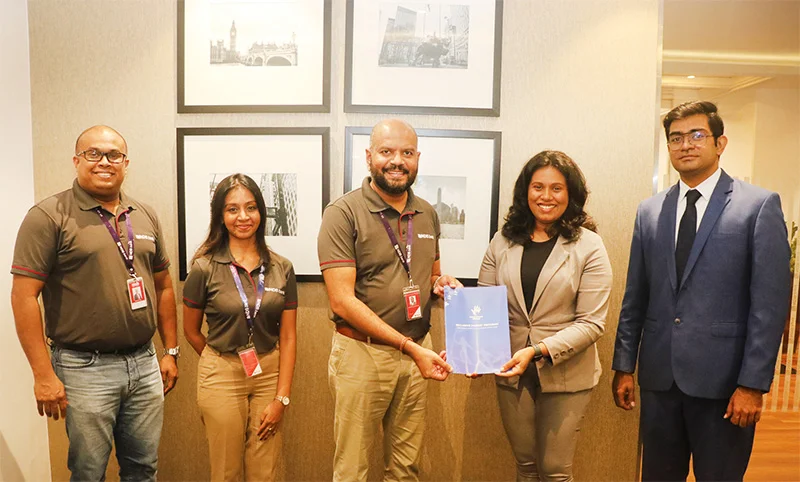Business
‘Take better advantage of present trade preference with US’

Seated from L-R: Ms. Dinithi Dias, Manager Business Council, Ceylon Chamber of Commerce; Sanji De Silva, Vice President SLUSABC; Alaina B. Teplitz, the ambassador of the United States of America to Sri Lanka and the Maldives; Dr. Asanka Ratnayake, president SLUSABC; Mohan Mendis, treasurer SLUSABC; Samantha Rajapaksha, Immediate Past President SLUSABC. Standing from L-R: Charithra Hettiarachchi, HVA Foods PLC; Waruna Randeewa, CBL Natural Foods (Pvt) Ltd; Tilak Gunawardena, MAC Holdings (Pvt) Ltd; Sanjaya Samararatne, Global Rubber Industries (Pvt) Ltd; Shane Perera, Regency Teas (Pvt) Ltd; Indika Kulathunga, Dipped Products PLC; Farhath Armith, Fanam International (Pvt) Ltd.
SL companies urged –
Trade between Sri Lanka and the US can grow further and one way Sri Lankan companies can maximize trade with the US is to take better advantage of existing trade preferences between the countries, US ambassador to Sri Lanka and the Maldives Alaina B. Teplitz said. Teplitz was addressing the Sri Lanka-USA Business Council (SLUSABC) of the Ceylon Chamber of Commerce as chief guest on September 17 at the 4th AGM of the organization. Dr. Asanka Ratnayake, Director, Hayleys Advantis Ltd. was re-elected president of the SLUSABC for 2020/2021.
Teplitz added –
For example, did you know that exports under the Generalized System of Preferences or GSP accounted for 5.32 percent of the total exports to the U.S. in 2019? That seems like a very small percentage. A total of 196 million in exports were eligible for cost savings under GSP. This is a marketing advantage that Sri Lankan firms should be broadcasting to prospective buyers as a reason to buy from these companies. It’s an advantage that, in fact, we do not want to be kept a secret. We want Sri Lankan businesses to know about these opportunities, which is why the embassy facilitated discussions as recently as last week explaining how GSP exporters can take better advantage of GSP benefits and we’ll continue to discuss that topic if there is further interest”.
President of the Council, Dr. Asanka Ratnayake mentioned that, “Today, we are all faced with an unforeseen challenge, that is, Covid-19 pandemic – which is the biggest disruptor of life and commercial activities in recent history. It has transformed the world. We can either lead this transformation or we can wait for it to disrupt us. However, the pandemic also gives us reasons to be optimistic. In the recent years, Sri Lanka has been increasingly featured in discussions on the Asian geopolitical environment. Undoubtedly our strategic location across the Indian Ocean sea-lanes has been attracting the interest of major powers such as India, China and more recently, Japan and the US. While this has its own merits and de-merits, I hope Sri Lanka will be able to withstand to play a new role on Asia’s rapidly changing geopolitical stage and convert it to country’s own long-term economic benefit.”
Sanji de Silva, Bileeta (Pvt) Ltd was elected as the vice president and Mohan Mendis, Heritage Teas (Pvt) Ltd was elected as the treasurer for the period 2020/2021.
CBL Natural Foods (Pvt) Ltd, Dipped Products PLC, Fanam International (Pvt) Ltd, Global Rubber Industries Pvt Ltd, HVA Foods PLC, MAC Holdings (Pvt) Ltd and Regency Teas (Pvt) Ltd were elected from the membership to serve on the Executive Committee of the Council.
Further details regarding membership of the Council could be obtained from the Secretariat of the Sri Lanka – USA Business Council of the Ceylon Chamber of Commerce, No. 50, Navam Mawatha, Colombo 2. E-mail: dinithi@chamber.lk or Tel.: 011-5588861, 5588800.
Business
Hemas posts resilient nine-month results

During the quarter, macroeconomic conditions reflected selective cost pressures alongside areas of stability, with a moderated net impact on the Group’s performance.
The Sri Lankan Rupee depreciated by 2.4%, driven by higher import-related foreign exchange outflows and cyclone-related economic disruption. This created some pressure on imported inputs, particularly in Consumer Brands and Healthcare, which was partially mitigated through pricing actions, procurement discipline and cost optimisation initiatives.
Monetary conditions tightened, with the Average Weighted Prime Lending Rate (AWPLR) rising by 89 basis points to 8.94%. The impact on the Group was contained due to its strong balance sheet, negative net gearing and disciplined funding strategy, limiting the effect on finance costs.
Inflation remained low at 2.1%, helping to contain operating cost escalation and preserve consumer affordability. In parallel, softer global palm oil and crude oil prices provided relief on input and energy costs, partially offsetting currency pressures.
In December 2025, the IMF approved US$ 206 million in emergency financing to support Sri Lanka’s cyclone recovery. Sovereign credit ratings were maintained during the period, supporting overall macro stability and business confidence.
Impact from Cyclone Ditwah
Cyclone Ditwah, which struck Sri Lanka on 25 November, was one of the most severe natural disasters experienced by the country in recent decades. The cyclone resulted in an estimated US$ 4.1 billion in direct economic damage—approximately 4% of national GDP—impacting homes, agriculture, infrastructure and livelihoods, with nearly two million people affected nationwide.
The Group’s manufacturing and service facilities did not sustain any direct physical damage, reflecting the effectiveness of proactive preparedness measures and robust business continuity frameworks across our operations. However, in the affected areas, the broader business ecosystems were significantly disrupted due to damage to personal assets, commercial premises, inventory losses, and disruptions to public transportation & logistics infrastructure, adversely impacting our employees, distributors and retail partners, including pharmacies.
These factors led to temporary supply-chain and distribution disruption during November and December, alongside a short-term deterioration in consumer sentiment. As a result, demand softness was observed during the latter part of the third quarter, particularly within the Consumer Brands and Healthcare sectors. Demand has since stabilised, with encouraging recovery trends evident, entering the fourth quarter.
In parallel, the Group mobilised a coordinated, multi-sector disaster response, working closely with government authorities, community organisations and local stakeholders. The Group committed approximately Rs. 30 million in financial and in-kind humanitarian assistance, focused on immediate relief for vulnerable communities. In addition, the Group has factored in Rs. 200 million for targeted support to small and medium enterprises across our value chain through extended credit terms, stock replenishment and business restoration initiatives. (Hemas)
Business
Corporate quarterly results continue to snag CSE vibrancy

The CSE commenced on a positive note yesterday but later the All Share Price Index slumped due to corporate quarterly results not reaching expected levels, market analysts said.
Amid those developments both indices indicated mixed reactions. The All Share Price Index went down by 103.17 points, while the S and P SL20 rose by 2.48 points. Turnover stood at Rs 3.55 billion with seven crossings.
Those crossings were: Tokyo Cement 2.58 million shares crossed to the tune of Rs 268 million; its shares traded at Rs 104, ACL Cables one million shares crossed for Rs 100 million; its shares traded at Rs 100, Cargills Ceylon 75000 shares crossed for Rs 54.7 million; its shares traded at Rs 730, LB Finance 302000 shares crossed for Rs 49.5 million; its shares traded at Rs 164, Tokyo Cement (Non-Voting) 570,000 shares crossed for 49 million and its shares traded at Rs 85.90, Seylan Bank 430,000 shares crossed for Rs 47 million; its shares sold at Rs 109.50 and HNB (Non-Voting) 70600 shares crossed for Rs 28 million; its shares traded at Rs 369.
In the retail market top seven companies that mainly contributed to the turnover were; Cargills Rs 206.6 million (283,000 shares traded), Renuka Agri Rs 153.5 million (9.6 million shares traded), ACL Cables Rs 148 million (1.45 million shares traded), Easter Merchants Rs 140 million (8.11 million shares traded), TJ Lanka Rs 109 million (2.8 million shares traded), Ceylon Land and Equity Rs 106 million (4.9 million shares traded) and Colombo Dockyard Rs 76.6 million (517,000 shares traded). During the day 158 million share volumes changed hands in 34681 transactions.
It is said that construction related companies and manufacturing and financial services related companies performed well. Top negative contributors to the ASPI were Senkadagala Finance (down Rs 68.50 at 837), Cargills (Ceylon) (down Rs 21 at 730), and Dialog Axiata (down 60 cents at Rs 32.70).
Yesterday the rupee was quoted at Rs 309.50/55 to the US dollar in the spot market, from Rs 309.43/50 the previous day, dealers said, while bond yields dropped significantly.
A bond maturing on 15.12.2029 was quoted at 9.45/55 percent.
A bond maturing on 15.03.2031 was quoted at 9.82/87 percent.
A bond maturing on 01.10.2032 was quoted at 10.15/20 percent, down from 10.17/21 percent.
A bond maturing on 01.06.2033 was quoted at 10.45/50 percent, down from 10.50/54 percent.
A bond maturing on 01.11.2033 was quoted at 10.60/62 percent.
A bond maturing on 15.06.2034 was quoted at 10.65/70 percent, down from 10.77/81 percent.
A bond maturing on 15.06.2035 was quoted at 10.72/75 percent, down from 10.95/98 percent.
An auction of Rs. 90,000 million Treasury bills is scheduled to take place today and an auction of Rs 51,000 million Treasury bonds tomorrow.
By Hiran H Senewiratne
Business
NDB renews membership with Parenthood Global Association

NDB Bank has renewed its membership with the Parenthood Global Association for the second consecutive year, reaffirming its strong commitment to fostering a workplace culture that supports, empowers, and understands the needs of working parents. This renewed partnership underscores NDB’s belief that an inclusive and equitable work environment must make space for the realities and responsibilities of modern parenthood.
The Parenthood Global Association is dedicated to helping organisations build family-friendly workplaces that nurture well-being, productivity, and work-life integration. NDB’s continued affiliation with this prestigious body reflects the Bank’s sustained efforts to enhance the support systems available to employees navigating both professional responsibilities and parental duties.
For NDB, supporting working parents goes beyond policy, it is an extension of the Bank’s human-centric philosophy and its commitment to creating an environment where every employee feels valued and understood. Through this partnership, the Bank continues to strengthen structures that enable parents to thrive, including flexibility initiatives, parental support mechanisms, wellness resources, and awareness-building across the organisation.
These efforts reinforce NDB’s broader Diversity & Inclusion agenda, which seeks to champion equality across all demographics while cultivating a workplace built on empathy, understanding, and opportunity. By renewing its membership with the Parenthood Global Association, NDB reiterates its dedication to ensuring that its employees—especially those juggling multiple roles—have access to the tools, support, and inclusive culture they need to succeed both at work and at home.
-

 Features3 days ago
Features3 days agoMy experience in turning around the Merchant Bank of Sri Lanka (MBSL) – Episode 3
-

 Business4 days ago
Business4 days agoZone24x7 enters 2026 with strong momentum, reinforcing its role as an enterprise AI and automation partner
-

 Business3 days ago
Business3 days agoRemotely conducted Business Forum in Paris attracts reputed French companies
-

 Business3 days ago
Business3 days agoFour runs, a thousand dreams: How a small-town school bowled its way into the record books
-

 Business3 days ago
Business3 days agoComBank and Hayleys Mobility redefine sustainable mobility with flexible leasing solutions
-

 Business4 days ago
Business4 days agoHNB recognized among Top 10 Best Employers of 2025 at the EFC National Best Employer Awards
-

 Editorial6 days ago
Editorial6 days agoAll’s not well that ends well?
-

 Business4 days ago
Business4 days agoGREAT 2025–2030: Sri Lanka’s Green ambition meets a grid reality check



















